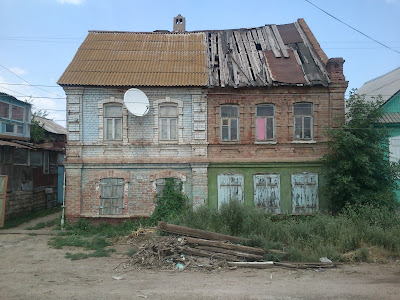To jsme takhle přejeli tu plnou čáru, kterou vidíte na fotce výš. Normálně se za to v Rusku bere řidičák, řidič Petr z Čech ale po půlhodině smlouvání usmlouval "pokutu" 100 euro a tak jsme mohli pokračovat dál směrem na Moskvu.
We crossed the full line that you can see on the picture above. Normally it costs a driving licence in Russia. It took half an hour and 100 euro "fine" to my driver Peter from Czech republic and we could continue in our direction to Moscow.
Ty značky nalepené na zádi kamionu mají své opodstatnění. V Rusku se během zcela iracionálně vzniklých zácp na silnici (anebo racionálně vzniklých front na hranicích) zcela běžně předjíždí jak z leva tak i z prava.
The signs on the back of the truck have its own reason. In Russia while there is a traffic jam or a queue on the border drivers pass waiting cars not only from the left but also from the right side.
Je třeba ještě dodat, že z Volgogradu jsem jel přímo na ruskou Radugu (Rainbow), která se konala asi 100 km na severovýchod od Petrohradu kdesi v Lesích. Moskvu jsem objel po nejvnějším okruhu. Cesta mi zabrala asi tři a půl dne stopování.
I must mention that from Volgograd I hitchhiked straight to the Russian Rainbow (Raduga) which took place 100 km to the north east from St. Petersburg somewhere in the forests. I passed Moscow on the third outer roundabout. The journey took me three and a half day of hitchhiking.
Cesta lemovaná jedovatými bolševníky. Odkud k nám asi ty bolševníky dorazily?
The road lined by big Hogweed plants. Where could these plants come from? (In Czech the plant is called Bolshevnik:)
 |
| A zde ono předjíěždění zleva./ The mentioned practice of passing cars from the left side. |
A to jsem takhle umýval nádobí v řece co jsem vylovil ze skládky u cesty a co to nevidím ...
I was washing some dishes that I found in a garbage by the road and look what I saw ...
A pak začal plavat směrem ke mě, jenže já se postavil a když mě uviděl, rychle to otočil zpátky. Medvědi jsou v létě prý vegetáriáni a žerou hlavně různé bobule v lese.
And then the bear started to swim in my direction. But when the bear saw me it turned back very quickly and disappeared in the reeds. Bears are vegetarians during summer. They eat only some berries in the forest.
 |
| Cestou do hlubin lesů na ruskou Radugu.../ On the way to the Rainbow gathering ... |
 |
| Výhled z mého stanu/ View from my tent |
 |
| Tu stál můj stan/ There was my tent standing |
 |
| Bohužel jediná fotka z překrásného Petěrburgu. Pak se mi rozbil telefon./ This is unfortunately the only picture from St. Petersburg. Then I broke my phone. |
Tak jsem dokončil svoji cestu po Rusku. A hodně nebylo řečeno protože tahle poslední část zahrnuje skoro dva týdny, které jsem strávil na Rainbow a v Petěrburgu, a které byly snad nejlepším obdobím v Rusku protože jsem si našel hodně přátel, naučil se spoustu Ruštiny a potkal divokého medvěda. V nejlepším jsem odcestoval a den před vypršením platnosti mého ruského víza jsem opustil zemi. Pak jsem jel přes Finsko, po lodi do Švédska, kde jsem měl velké problémy se stopem protože tam prý zrovna řádil jakýsi východoevropský silniční gang a protože jsem nevěděl, že jedna míle ve Švédsku ve skutečnosti znamená 10 kilometrů, odmítl jsem tak několik řidičů s tím, že se mi ani nevyplatí na tu jednu nebo dvě míle nastupovat když jsem na tak dobrém místě na stopování. Nakonec jsem se ale šťastně dostal do Norska na farmu. Tam jsem asi 6 týdnů pracoval a pak jel na sever na Lofoty (http://cumimdoblba.blogspot.cz/2013/09/lofoten.html) do Tromso pozorovat polární záře a pak domů.
Teď jsem doma už přes dva měsíce a pomalu zase vyrážím kamsi na jihozápad. Nevím jestli tady anebo na jiném linku, ale snad se brzo dokopu pokračovat v psaní na blog...
So I finished my journey in Russia. Many things have not been told. This post actually contains nearly two weeks which I spent at the Rainbow gathering and in St. Petersburg. And it was some of the best moments from the time I spent in Russia. I made a lot of friends, learned Russian language a lot and I met the wild bear. I left the country at the best. I passed the border to Finland just one day before my visa was expired, crossed the sea to Sweden where I got stuck a little bit because I had problems to hitchhike. There was a road gang operating at that time and also I did not know that the Swedish mile means ten kilometers (I refused to go with some drivers just one or two miles:) But finally I reached Norway and the farm where I worked for 6 weeks. Before going home I travelled to Lofoten (http://cumimdoblba.blogspot.cz/2013/09/lofoten.html) and to Tromso to see the northern lights.
It has been more than two months since I arrived home and I am leaving again. Soon I will go somewhere to the south west. I am not sure if here or at some other link but soon if I am not too lazy I will continue blogging...




















































